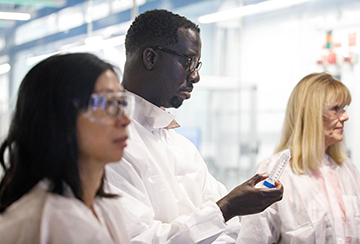This Lung Cancer Awareness Month (LCAM), Georgia native, Gwen, shares how lung cancer impacted her and her family, and the vital role comprehensive biomarker testing played in her treatment.
Personalizing Care Through Biomarker Testing
Gwen’s story began in 2020 when she was visiting her sister’s family in New York and could not stop coughing. A trip to the ER and subsequent X-ray revealed a diagnosis of stage IV non-small cell lung cancer (NSCLC), devastating Gwen and her family. Genomic testing performed by her initial oncologist confirmed that her cancer contained the KRAS G12C mutation, found in approximately 13% of patients with NSCLC.1 Identifying this mutation helped Gwen and her doctor develop a personalized treatment plan for her specific type of lung cancer.
“You have to be your own advocate,” said Gwen. “You need to say, ‘I want my biomarkers done, I want genetic testing,’ because it's so important in the decision-making process.”
Knowing Your Biomarker Test Results Throughout Treatment
Roughly half of all patients with NSCLC harbor a targetable driver mutation responsible for initiating cancer and driving its growth. Further data proves that a targeted therapy enabled by biomarker testing can lead to improved outcomes.2 In small cell lung cancer (SCLC), where precision medicine is not as advanced, research is ongoing to identify targeted therapies for analogous tumor biomarkers, including Amgen’s research on targeting the DLL3 protein, an emerging biomarker found on the surface of SCLC cells in more than 80% of patients with SCLC.3
And while studies reveal that biomarker testing rates are improving, gaps remain. The use of biomarker testing by community oncology practices lags significantly compared to academic centers.4 Black patients were found to be approximately 20% less likely to receive next-generation sequencing (NGS) biomarker testing than White patients and smokers were less likely to receive biomarker testing than nonsmokers.5,6
Amgen research shows that oncologists face obstacles when retrieving testing results at second-line treatment. Re-assessing biomarker testing, or re-testing, if necessary, at disease re-occurrence or progression is critical as new treatments may be available since a patient was last tested.
“Every cancer is different, so having access to your biomarker testing results and understanding your personal biomarker status at each step of your treatment journey is like having a compass as you find your way,” said Sumita Bhatta, vice president, Global Medical, Oncology Therapeutic Area Head, at Amgen. “Advocating for testing is important for all patients, no matter if they were just diagnosed, if their cancer has progressed or if they are seeing a new health care professional.”
Learn more about the value of biomarker testing at every step of care at NoOneMissed.org.
References
- Amgen Data on File: Analysis of AACR Genie v12, 5-Table-1.
- Kris MG, et al. JAMA. 2014;31:1998-2006.
- Owen DH, et al. J Hematol Oncol. 2019;12:61.
- L. Boehmer, et al. Science Direct. 2021;16(10):S863-S864.
- Bruno DS, et al. J Clin Oncol. 2021;39(15 suppl):9005.
- Gutierrez ME, et al. Clin Lung Cancer. 2017;18:651-659.





